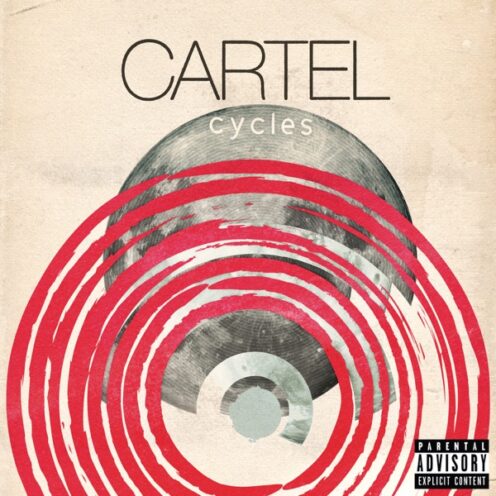
After suffering a disaster of Titanic-like proportions (the actual boat, not the movie), Cartel are hoping to recover from the self-titled backlash with Cycles, an album that proves Chroma was the initial jump, Cartel was the (imperfect) landing and Cycles is the massive bounce back. Full of shimmering pop numbers built on shiny-riffs and colossal production, Cycles is a dubious return to the power-pop that launched the band into the stratosphere. “Let’s Go” shakes off all previous binds and lets the band rock their socks off before ensuring that the slump is now indeed over. While there isn’t anything as riveting or as bombastic as the “Q/A” combo, Cartel prove that keeping it simple is just as wildly spirited as anything else they have achieved.
Their self-titled release does gather a little more criticism than it ultimately deserves, and for the sheer fact the band actually tested the waters of a all-together different sound is at least worth a few nods. Despite the results that ensued upon release, Pugh still proved he is one of the most talented vocalists working today, and while there’s hardly any room for improvement, his charm works best when he is given songs like “Conventional Friend” or “Retrograde,” two sizzling numbers that bask in aggressive melodies. The man’s voice is the biggest draw for Cartel, and without his whimsy, there may not be enough to pull casual listeners in. Sure, the production does halt it at times (mostly on “Faster Ride” and “It Still Remains”), however it’s the band’s calling card. Like Jimmy Eat World, Cartel kicks formula around here and there, but creates a vivid portrait of what good pop-rock should always be: muscular and tight, and a playground for a vocalist (just listen to how much fun Pugh has on the verses of “Typical”).
Let’s not get too hasty and dismiss the other band members now – they have obviously shown that they are able to keep up with Pugh’s talents, and Joseph Pepper & Nic Hudson’s dual-layered guitars strengthen the literal muscle of Cartel’s enthusiastic adoration for wall-of-sound pop; Jeff Lett’s bass roars across the rhythm section, especially in the album’s strongest numbers near the end of the record. Kevin Sanders outdid himself last time around as the all-around standout that many claimed was the savior of the record, and this time, it’s no different; his drumming is persistent, steady and superior to nearly every other pop-rock percussionist out there. Cycles presents itself as a new phase in what the band hopes is a long life past that whole bubbly incident on MTV a few years back. Make no mistake that this is glossy, slickly-produced pop music through and through… but if you crave crunchy guitars that sound like Lily Aldrin chewing on Cocoa Puffs into an amplifier… here’s your source material, baby.
By the time the record hits its stride around the seventh track, it makes you forget the band’s few mistakes. “Faster Ride” feels like it is looking for an auto-tuned remix to come give it a touch-up, and “The Perfect Mistake” lacks a truly memorable or gratifying chorus (as does the aforementioned “Typical,” which rides out its boring hook with some wicked verses). Despite the weird burp near the end of “Deep South,” there’s a candid charm to Pugh’s serenade to his homeland, and while some lyrics come across as cheesy on “It Still Remains” or “Only You,” both pack in such irresistibly tight pop melodies, it is increasingly difficult to dislodge them out of your brain. “27 Steps” and “See Me Now” are the best songs Fall Out Boy forgot to write for From Under the Cork Tree, and with every future listen, it appears that Cartel have shaken off all the critics and started anew – not just with a new label, but a new approach to maintaining that sense of urgency and delivering satisfying hooks that don’t overwhelm upon first listen. Cartel may have just recorded the first pop-rock album in years that actually balances itself on sugar-intake and forgetting to overcompensate (and hallelujah, no Wyclef Jean remixes!).
As Pugh openly admits on “Retrograde,” “I have no remorse, I have no shame… I’m looking for the center of this life I’ve found.” The band sounds happier, unified as a collective whole – therapeutic even – and it shows through the lack of overachieving, which was the decline of that peach tree album. “Let me reintroduce myself,” Pugh confidently addresses on the opening track. While the band may never please those who want the second-coming of Chroma, eleven tracks of what is sure to be 2009’s best entry in the pop-rock genre ain’t gonna do you wrong. Take that, Tom Higgenson.
 27 Steps
27 Steps